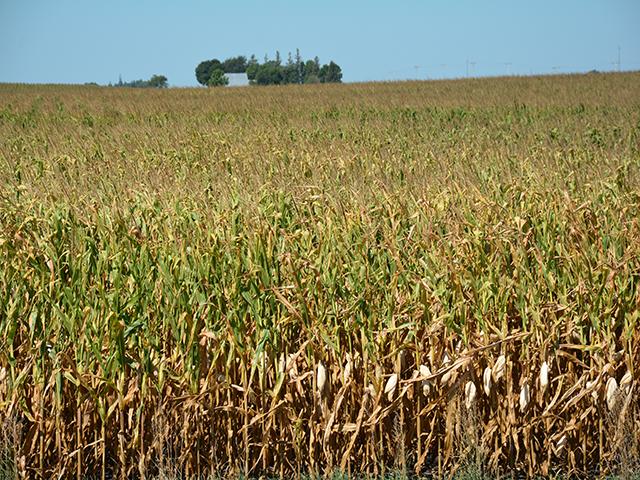Crop Production and Climate Impacts
Climate Change Will Slow Midwest Yield Increases for Corn, Soybeans, Wheat
DES MOINES (DTN) -- Midwest farmers will struggle more in the coming years to hit the yield increases they have come to expect over the past generation.
A new report released Wednesday by Environmental Defense Fund at the World Food Prize Borlaug Dialogue looked at corn, soybean and wheat yields. The analysis used 20 different computer models to analyze how climate change will alter yields in Iowa, Minnesota and Kansas by 2030 and 2050.
In each state the temperatures for growing-degree days will increase, but so will the number of days with extreme heat. "Killing-degree days" -- those with temperatures above 84 F that inhibit crop growth -- will increase 57% for corn by 2030 in Iowa, for instance. For soybeans in Minnesota, the killing-degree days will increase by 55% by 2030.
By 2030, nearly all counties in Iowa will see corn yields that are more than 5% lower than they would have been without climate change. More than half will see declines of 10% or greater.
More than half of Minnesota counties will see soybean yields drop by more than 5% from what they would have been without climate change. As many as 12 counties in the state will see soybean yields decline more than 10% by 2030.
In Kansas, counties will see winter wheat yields drop by more than 5% from what they would otherwise be without climate change. Some counties in the state will see yield declines of as much as 16%. Still, the models show some counties in Kansas also will see wheat yields increase as much as 25%.
The models show yields would continue to grow, but see more year-to-year variability and yield fluctuations. Some parts of each state are affected more negatively than others as well. The modeled yields include assumptions about innovations, technology and factored in expected emission reductions to aid the climate.
P[L1] D[0x0] M[300x250] OOP[F] ADUNIT[] T[]
"One of the things that comes out in this report is how fragile our agricultural system is," said Jerry Hatfield, a retired soil scientist and former director of the USDA Midwest Climate Hub.
Hatfield pointed to the seasonal shifts of rainfall in the Midwest and the impact that has on producers who often see a narrower planting window. "You can look at how much the size of equipment has exploded just because producers need to get things done."
Adaptation will reduce breeding changes to crops, increased use of precision agriculture, shifting of crop production and diversifying rotations at the farm level.
Stefanie Millie Grant, a senior manager for external affairs and sustainability at Unilever, said at the forum the report may not be popular, but changes are needed to the federal crop insurance program to reduce the constant focus on crop yield. More attention should be given to the practices farmers apply on their farms.
"We have got to change how crop insurance is looked at today," Grant said, adding crop insurance needs to go beyond yield to "look at farming practices instead of just focusing on yield."
Grant recognized her stance may not be popular with some farm and commodity organizations that are asking for Congress to protect crop insurance without adding a tie-in with climate-smart practices.
EDF and some partner farmers at the event spotlighted last month's announcement of $2.8 billion for climate-smart farming practices under USDA's Partnership for Climate-Smart Commodities as well as the $19.5 billion for USDA conservation programs in the Inflation Reduction Act.
Seth Watkins, a livestock producer and farmer near Shenandoah, Iowa, said he would like to see more research farms developed regionally to examine how climate-smart farming practices can be applied locally. He pointed to the no-till Dakota Lakes Research Farm in South Dakota as an example.
"Before we start thinking 60 more years of technology is going to solve this problem, let's start working with Mother Nature first," Watkins said.
The EDF study can be found at https://www.edf.org/…
Also see "USAID Chief: Other Countries Need to Step up Humanitarian Aid," https://www.dtnpf.com/…
Also see "Conflict, Productivity, Climate and Innovation Drive Global Food Security Focus," https://www.dtnpf.com/…
Chris Clayton can be reached at Chris.Clayton@dtn.com
Follow him on Twitter @ChrisClaytonDTN
(c) Copyright 2022 DTN, LLC. All rights reserved.




